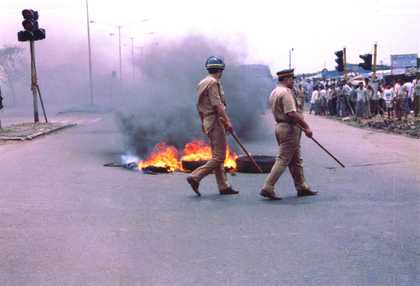
Anand Patwardhan, Jai Bhim Comrade 2012
We Are Not Your Monkeys
India 1996, video, 5 min, Hindi, English subtitles
The camera watches the urban poor seated and standing in a circle radiating out from Sambhaji Bhagat, the charismatic Dalit singer who declares: ‘The rulers who controlled all knowledge and claimed the Ramayana to be India’s history called us many names: Demons, low castes, Untouchables, But we were the aborigines of this land, Listen to our story.’ Accompanied by three percussionists and chorus, this opening statement introduces We are not your Monkeys as a revisionist rereading of the Ramayana’s glorification of the caste system. We are not Your Monkeys is a powerfully rhythmic anti-caste protest song written by Bhagat, Patwardhan and the late Dalit activist Daya Pawar that self-consciously draws upon Dalit critiques of the Ramayana’s sanctification of racism. Scenes of Dalits lowering themselves into sewers, fundamentalists hammering at the Ayodyha mosque and details from Ramayana comics combine in a montage that reveals Patwardhan’s desire to disenchant the visual pleasures gained from encounters with the images of the Hindu pantheon.
Jai Bhim Comrade
India 2012, video, 180 min, Hindi, English subtitles
This film file is broken and is being removed. Sorry for any inconvenience this causes.
Anand Patwardhan: discussion of Jai Bhim Comrade
Although Jai Bhim Comrade is not translated into English, it is possible to approximate a translation. ‘Jai’ translates as ‘Victory’, as a cry of Victory to the liberation struggles of the Dalits. ‘Bhim’ is the affectionate abbreviation of Bhimrao, the first name of Dr Bhimrao Ambedkar, the Dalit lawyer who was Chair of the Drafting Committee of the Constitution of India and who encouraged Dalits to convert to Buddhism and reject the Hindu caste system that condemned them to social death. ‘Comrade’ stands for Vilas Ghogre, the Dalit Marxist whose suicide triggered the film. The term ‘Comrade’ evokes solidarity but also alludes to the tensions between Ghogre and his the Communist Party, between Ambedkar and the Congress Party and the Dalit movement’s unresolved argument with Communism. Each word in the title alludes to longstanding debates over the legacy of Ambedkar. Every one in the film is struggling over this political and religious inheritance that takes on an aesthetic dimension. The statue of Ambedkar that was desecrated with a garland of shoes, the portrait of Ambedkar on a wall in a humble Dalit room, the fundamentalist Narendra Modi seen draping a garland around a golden statue of Ambedkar, the advertising hoarding with the face Ambedkar opposite the face of the sociopath Bal Thackeray of Shiv Sena, Sheetal Sathe of the Dalit cultural group Kabir Kala Manch, demanding ‘O Bhim come out from that statue’: each of these indicates the use and abuse of history in the present. Jai Bhim Comrade does not only narrate these debates into a complex montage, important though that is. In showing the different groups of ex-Dalit Panthers, Communists, Hindu fundamentalists and young radicals all fighting over the political symbolism of Ambedkar, it intervenes in support of a future India that has annihilated caste, a direction that is spelt out by Sheetal Sathe who sings the last words of the film.
Curated by The Otolith Collective. Followed by response and audience discussion with John Akomfrah, Anand Patwardhan, Kodwo Eshun, Anjalika Sagar, Sushrut Jadhav and John Akomfrah.
Dr Sushrut Jadhav
is a clinical psychiatrist and medical anthropologist. He is currently Clinical Senior Lecturer in Cross-cultural Psychiatry at University College London; Consultant Psychiatrist, Focus Homeless Outreach Services for the mentally unwell, Camden and Islington NHS Foundation Trust; Founder-Editor of the international journal, Anthropology and Medicine (Taylor & Francis); & Co-director, UCL Cultural Consultation Services. His teaching and research revolves around the axis of mental health at the margins of society across cultures with a focus on India. He has taught, researched and examined at several national and international universities. Dr Jadhav currently supervises doctoral candidates conducting research on Cotton Farmer suicides (Andhra Pradesh); Caste, Conversion & Stigma (Pune); Mental Health dimensions of Human-Elephant conflict (Assam); Social exclusion of Children from Supplementary Nutrition Program (Gujarat); Stigmatisation of Homeless Women (Chennai); Poverty & Mental Health (Delhi); & Rehabilitation of Child Soldiers (Nepal). Further details.here.
John Akomfrah
is a filmmaker, artist and theorist who lives and works in London. He is a founder member of Smoking Dogs Films and Black Audio Film Collective.
His recent works include The Stuart Hall Project 2013, The Unfinished Conversation 2012 and Peripeteia 2012. Recent exhibitions and festivals include Sundance Film Festival, 67th Venice International Film Festival, New Art Exchange, Nottingham and Sharjah Biennial 11.
John Akomfrah is a filmmaker, artist and theorist who lives and works in London. He is a founder member of Smoking Dogs Films and Black Audio Film Collective. His recent works include The Stuart Hall Project 2013, The Unfinished Conversation 2012 and Peripeteia 2012. Recent exhibitions and festivals include Sundance Film Festival, 67th Venice International Film Festival, New Art Exchange, Nottingham and Sharjah Biennial 11.
- Download the programme notes [PDF, 5.8MB]
